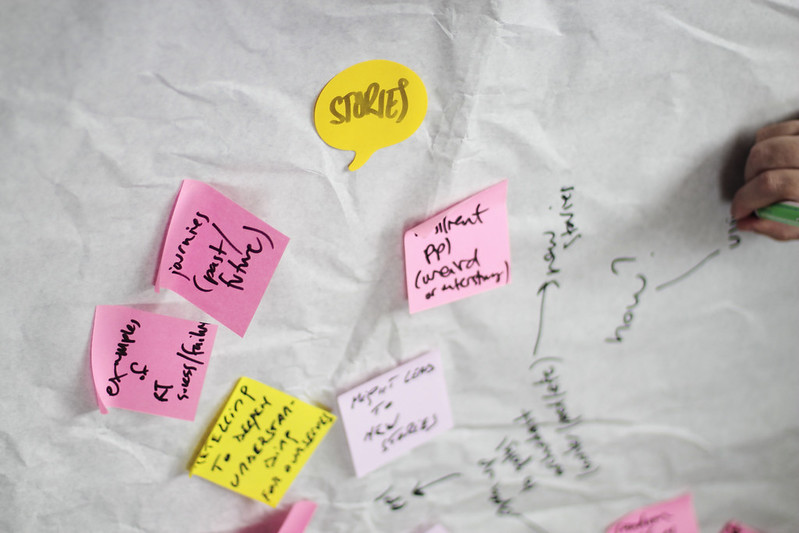This is an old revision of the document!
Resilients in review: a diversity of practices
This page is an overview of the featured chronicles of the Resilients team. Spanning several countries, two continents, numerous roads, paths, rivers, canals, and living labs, the wide geographical spread of the Resilients' activities is mirrored in the diversity of their practices. From biking, hiking and boating to growing, gardening and future-building – in all cases they have sought to step beyond the bounds of theoretical debate to explore and embed resilient cultures in concrete practice.
In Words which Matter to People, Dougald Hine questions the concept of “resilience” itself – not through an academic debate, but by talking to people on the streets of Helsinki about the Finnish word sisu. Comparing their visceral and culturally grounded use of this concept with the distant, etiolated notion of “resilience” as it is deployed in political, environmental and scientific discourse, he finds that the meaning we make or find in the world – embodied in such notions as sisu – is deeply bound up with our capacity to endure in turbulent times. Read more about Dougald’s travels as journeyman and artist in transience in this wide-ranging conversation with Shelbatra Jashari for the Resilients project.
Tim Boykett, Pippa Buchannan and a motley crew of enthusiastic DIY sailors embarked on an exploration of water rights and “luminous green” sailing in Control of the Commons. In Resilient Boating, Tim writes of sustainability, graceful decay, and the balance of effort versus utility in the realm of boat building and sailing, while Pippa recounts how a confessed food lover embraces the challenge of improvised gourmet cooking for several people on a tiny boat in The Resilient Aristologist. Each of their boating adventures is narrated in the Murray River Journey, the Danube Journey, and the Belgian Canals – as are the details of how they went about constructing the two vessels they sailed, the Subak1 and Subak 2. Also check out some notes towards a manifesto of a DIY pirate.
Natalia Borissova explored augmented urban gardening through a series of living lab experiments with “non-green” mushrooms, finding in fungi an infinite source of inspiration for recycling and adaptation to changing environmental conditions. Her practical explorations in mushroom growing are documented in The Non Green (R)evolution, while Go Ask a Mushroom: musings on Afterculture advocates fungi and their mycelial roots as a source of continued inspiration for a resilient “life after culture.” At the same time, Dismas Leonard Sekibaha narrates his experiences at Time’s Up as “gardener in residence” – of both the green and non-green variety – in My Summer in an Urban Garden.
Edible Alchemy by Carole Collet and Bartaku discusses resilience and adaptation in relation to the properties of two intriguing plants – flax and Aronia – and how these were used in Temporary photoElectric Digestopians (TpED), a series of co-creation worklabs, and the Edible Alchemy Aperolab. Resilience Thinking DIY is an exercise held at the Central Saint Martin's College and summarised here to encourage the readers to practice resilient thinking in design. A Leaky Loop by Bartaku narrates the kind of intimate and bizarre experience you can expect as a TpED creator and tester, while Silients is a fragmentary meditation on a peculiar variation of “resilients.”
In The Pollinators, nadine review the meaning and implications of reviving modes of cultural travel where the journey is the destination, as an antidote to both tourism and the utilitarian obsession with getting from A to B in the shortest time and space.
Uroš Veber interviewed Helena Krapež, the owner of an excursion farm on the Gora plateau in western Slovenia, in If you can’t pay for a loaf, go bake your own: a fascinating ethnographic glimpse into the state of farming in this region – and by extension, the changes and upheavals taking place in wider society – and the resourcefulness of one woman in challenging circumstances.
Exploring methods of prototyping possible futures, Anna Maria Orru and David Relan discuss their scenario building toolkit in Composing a Scenario Symphony. This approach draws on a combination of Lance Gunderson and C. S. Holling’s panarchy systems model outlined in From Pan To Panarchy, and the idea of The Temporal Model in Future Scenario Building.

